The derailleurs move the chain smoothly between cogs and chainrings, but only if the travel of the derailleurs is set up correctly. Derailleur pivots and jockey pulleys must be checked for wear and lubrication. The front derailleur must be properly aligned with the chainrings.
How they work
The front and rear derailleurs change the gears. To change up a gear, the shifter is used to pull on the cable, which causes the front derailleur to push from a smaller to a larger chainring or the rear derailleur to push the chain from a smaller to a larger cog. To change down a gear, the cable is released, causing the springs in both derailleurs to move the chain to a smaller chainring or cog. Each derailleur moves around a pivot point. Adjusting screws ensure that the derailleurs do not push the chain beyond the largest chainring or cog, or pull it beyond the smallest. This range is called the derailleur's travel. Once its travel is set up, provided the cable tension is sufficient, the derailleur will make a single clean gear-shift for every click of the shifter.
Working with the shifters:
The front and rear derailleurs work in harmony with the shifters to provide easy, quick, and accurate gear-shifts whenever the rider needs them.
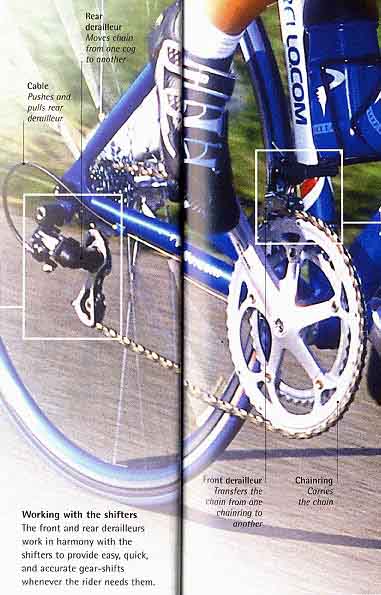
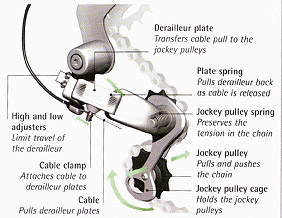
Rear Derailleur Mechanism
To change gears, two jockey pulleys transfer the chain onto a different cog. They move in the same plane as the chain and are spring-loaded to preserve the tension in the chain. Two derailleur plates enable the jockey pulleys to change gear upward, while the plate spring enables the jockey pulleys to change gear downward.
- Derailleur plate: Transfers cable pull to the jockey pulleys
- Plate spring: Pulls derailleur back as cable is released
- Jockey pulley spring: Preserves the tension in the chain
- Jockey pulley: Pulls and pushes the chain
- Jockey pulley cage: Holds the jockey pulleys
- High and low adjusters: Limit travel of the derailleur
- Cable clamp: attaches cable to derailleur plates
- Cable: pulls derailleur plates
Rear Derailleur In Use
When the cable is pulled, it causes both the derailleur plates to swing inward on four pivot points, causing the jockey pulleys to guide the chain onto a larger cog. When the cable is released, the plate spring moves the chain back to a smaller cog. The following images help to clarify these principles...
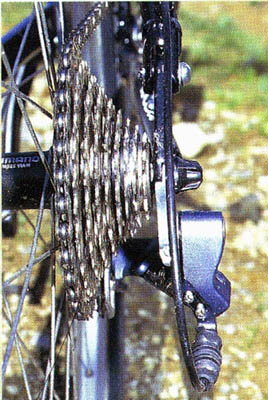
Above: Large cog: The chum is moved to the largest cog by the pull of the cable.
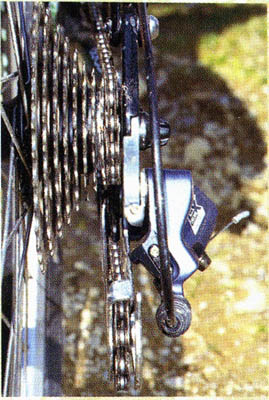
Above: Small cog: The chain is returned to the smallest cog by the plate spring.
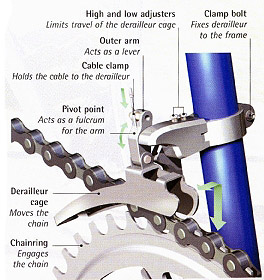
Front Derailleur Mechanism
When pulled, the cable moves the outer arm, which acts as a lever on a pivot point to push the front derailleur cage away from the bike. This moves the chain from a smaller to a larger chainring. When the cable is released, a spring on the derailleur’s inner arm pulls the cage back toward the bike.
- High and low adjusters: Limits travel of the derailleur cage
- Outer arm: Acts as a lever
- cable clamp: Holds the cable to the derailleur
- Clamp bolt: Fixes derailleur to the frame
- Pivot point: Acts as a fulcrum for the arm
- Derailleur cage: Moves the chain
- Chainring: Engages the chain